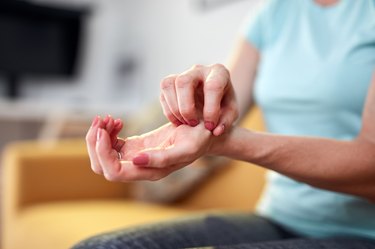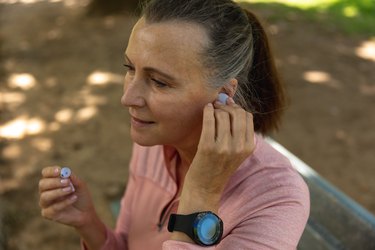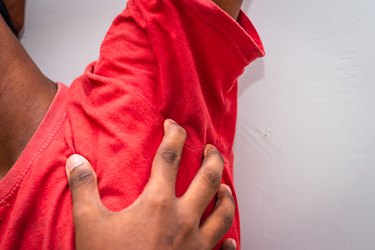
You normally use your palms and fingers to stop an itch. But the undersides of your hands themselves can sometimes get tickly or uncomfortable too.
Itchy palms can stem from a number of possible culprits. Most of them are benign and (thankfully) easy to manage, but in some cases, nonstop itching could be a sign of an underlying health problem, says Chicago-based board-certified dermatologist Jeffrey Hsu, MD.
Video of the Day
Video of the Day
Here's a look at the most likely causes and what you can do to get relief fast, plus when itchy palms warrant a call to the doctor.
1. You Have Dry Skin
Been washing your hands more than usual or spending time in cold, windy weather without gloves? Both can dry out the skin on your hands and leave your palms feeling itchy and tight, Dr. Hsu says.
If your palms are really parched, you might also notice patchy scales, flakes or cracks in your skin. Ouch.
Fix It
Slather on a hand cream with ingredients like glycerin, lactic acid or topical urea like CeraVe Therapeutic Hand Cream ($9.97, Amazon). "These are moisturizers that reduce skin water loss," Dr. Hsu says.
If frequent hand-washing is drying you out, suds up with a liquid soap containing added moisturizers such as SoftSoap Soothing Clean Moisturizing Liquid Hand Soap ($7.44 for a 6-pack, Amazon).
And tuck your hands into gloves or mittens when you're out in the cold. Exposure to dry winter air can make hands desert-like.
2. You Have Hand Eczema
Inflammatory skin conditions like eczema can flare up on your hands and palms, causing itchiness. You could also have dyshidrotic eczema — a skin condition that causes small blisters on the palms of your hands, per the National Eczema Association.
Some common triggers for eczema flare-ups include the following, per the National Eczema Association:
- Stress (causing stress-related eczema)
- Humidity and hot weather
- Environmental and food allergies
- Autoimmune diseases
It's easy to mistake the problem for a simple case of dry skin, but there are differences: "Eczema on your hands can present itself not only as itchiness, but as redness, crusting and inflammation," Dr. Hsu says. You might also notice a burning sensation or blisters.
Fix It
Natural remedies for eczema start with avoiding irritants that cause your skin to flare up.
Next, regularly apply a glycerin- or petroleum-based hand cream to restore your skin's barrier and heal cracks, which will ease dryness and itching. Try CeraVe Moisturizing Cream ($17.78, Amazon).
If you need itching relief ASAP, try an over-the-counter (OTC) steroid cream, Dr. Hsu recommends. Cortisone 10 Intensive Healing Lotion for Eczema ($8.34, Amazon) is a good option.
3. You're Allergic to Something
If your hands don't seem to agree with a new soap, detergent, lotion or even a piece of jewelry, your itch could be caused by contact dermatitis.
Dermatitis on your hands (due to common allergic reactions) can develop when skin comes in contact with an irritating substance, resulting in a rash — red palms, itching and burning — or hive-like bumps and swelling.
Fix It
Start steering clear of the offending substance right away to prevent further irritation, per the Cleveland Clinic.
Healing could take several weeks, but in the meantime, you can ease the itch with an OTC anti-itch cream like Benadryl Extra Strength Itch Stopping Gel ($5.97, Amazon).
4. You Have Psoriasis
If you have red spots on your hands — i.e., thick, red or silvery patches on your palms — you could be dealing with psoriasis.
The condition, which is sometimes confused for eczema, is an autoimmune disorder that speeds up the growth of skin cells, resulting in raised, scaly skin growths or bumps. The patches and itching can flare for weeks or months at a time, clear up and come back again, often in response to environmental triggers, per the Mayo Clinic.
Fix It
Similar to eczema, applying an OTC steroid cream can soothe itchy patches, Dr. Hsu says.
Keep in mind, though, that chronic skin conditions like psoriasis are best managed under the guidance of a dermatologist. Depending on your symptoms, you might opt for additional treatment including oral medications or phototherapy.
5. You Started a New Medication
Itchy skin on your palms or elsewhere can sometimes be the result of taking a new drug. Common culprits include heart medications like heparin, calcium channel blockers, ACE inhibitors and beta blockers, as well as antibiotics like penicillin, per a September 2019 Medicines study.
Some supplements could cause itching, too, if you end up having an adverse reaction to them. That's one reason it's important to talk to your doctor before trying a new medication or supplement, so you can discuss possible side effects.
Fix It
Let your doctor know if you think your medication is making you itchy. It may be possible to adjust your dose or switch to another drug.
6. You Have Carpal Tunnel Syndrome
Itching without a visible rash or bite could be due to carpal tunnel syndrome.
Early signs of carpal tunnel syndrome — where a nerve that runs from your forearm into the palm of your hand becomes pinched or compressed — can sometimes include an urge to itch your hands, or a tingling sensation in the hands, wrists or forearms, per the Cleveland Clinic.
As the condition progresses, you might start to notice numbness or pain as well.
Fix It
Taking breaks from typing or other activities that make your hands or wrists uncomfortable and applying ice packs can be helpful for early carpal tunnel syndrome and even make the problem go away, according to the Mayo Clinic.
If the condition progresses, you may need to use a wrist splint, take medication or even undergo surgery.
7. It's a More Serious Health Issue
Itchy palms without a rash often indicates an underlying health issue such as an overactive thyroid gland, liver or kidney disease, diabetes or a neurological condition, per the American Academy of Dermatology (AAD).
People with liver disease tend to have higher levels of bile salts built up under their skin, which can cause itching, per Baton Rouge General.
Autoimmune diseases can cause itchy palms, too. Lupus, hyperthyroidism (Grave's disease), type 1 diabetes and HIV can all cause an itchy rash that can manifest on the hands and other parts of the body, per the AAD. Other autoimmune blood disorders are also common culprits of itchy hands.
Finally, if you are itching and sweating from your palms more than usual, you may have hyperhidrosis, a condition where overactive sweat glands cause excessive sweat, per the Cleveland Clinic.
Fix It
If you are itching and suspect you may have one of the above conditions, make an appointment with your doctor ASAP for an evaluation.
Typically, once these conditions are managed with medications and/or other treatments, symptoms like itchy palms will subside.
How to Prevent Itchy Palms
- Avoid triggers: If you know you have an allergy to a particular substance or food that causes itchy palms (or causes you to be itchy all over), avoid those triggers.
- Moisturize: You can also prevent itchy palms due to dry skin by applying a daily moisturizer and washing your hands with soap for sensitive skin. If itchy palms are due to eczema, you can try wet wraps with socks and plastic wrap to trap in moisture, per the National Eczema Association.
- Protect your hands: If you are cleaning with irritating substances, you could also choose to wear rubber gloves to protect the skin on your hands.
- Talk to your doctor: Discuss the side effects of any potential new medication or supplement you plan to try with your doctor.
When to See a Doctor for Itchy Palms
Sometimes persistently itchy palms can be a sign of a serious underlying health condition, such as undermanaged diabetes, kidney disease or Crohn's disease.
"If you suspect the itching is a complication of diabetes, make an appointment to see an endocrinologist," Dr. Hsu says. "Otherwise, if your symptoms become severe or last for more than a few days, see a dermatologist."
If you have trouble making an appointment with a specialist or you're not sure about the underlying cause of your itchiness, you can also see your primary care doctor, who can evaluate you and make a referral.
- Mayo Clinic: "Psoriasis"
- Medicines: "Pruritus Associated with Commonly Prescribed Medications in a Tertiary Care Center"
- Mayo Clinic: "Carpal Tunnel Syndrome"
- Cleveland Clinic: "The Best Ways to Find Relief From the Pain + Tingling of Carpal Tunnel"
- Cleveland Clinic: "Contact Dermatitis"
- National Eczema Association: "Dyshidrotic Eczema"
- National Eczema Association: "Eczema Causes and Triggers"
- National Eczema Association: "Wet Wrap Therapy"
- AAD: "10 REASONS YOUR SKIN ITCHES UNCONTROLLABLY AND HOW TO GET RELIEF"
- Cleveland Clinic: "Hyperhidrosis"
Is this an emergency? If you are experiencing serious medical symptoms, please see the National Library of Medicine’s list of signs you need emergency medical attention or call 911.


